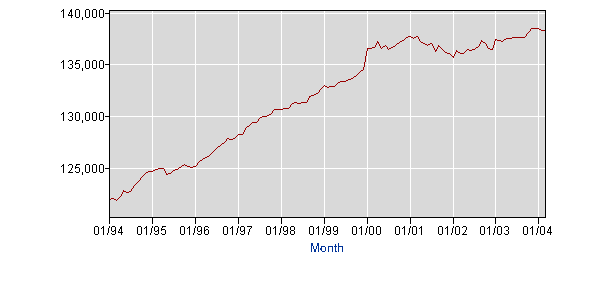
« Kerry Flip-Flops on Education Reform | Main | An Teanga Beo -- The Living Tongue »
Normally I don't even bother to read Bob Herbert in the New York Times' op-ed section, as he routinely bases his screeds on half-truths or sometimes flat-out lies, which the NYT rarely if ever corrects. However, this morning I had the misfortune of popping it up accidentally and reminding myself why I avoid him. Today's fractured fairy tale involves the recent gains in productivity and Herbert's assertion that employers are screwing labor in tandem:
American workers have been remarkably productive in recent years, but they are getting fewer and fewer of the benefits of this increased productivity. While the economy, as measured by the gross domestic product, has been strong for some time now, ordinary workers have gotten little more than the back of the hand from employers who have pocketed an unprecedented share of the cash from this burst of economic growth. ...Andrew Sum, the center's director and lead author of the study, said: "This is the first time we've ever had a case where two years into a recovery, corporate profits got a larger share of the growth of national income than labor did. Normally labor gets about 65 percent and corporate profits about 15 to 18 percent. This time profits got 41 percent and labor [meaning all forms of employee compensation, including wages, benefits, salaries and the percentage of payroll taxes paid by employers] got 38 percent."
The study said: "In no other recovery from a post-World War II recession did corporate profits ever account for as much as 20 percent of the growth in national income. And at no time did corporate profits ever increase by a greater amount than labor compensation."
In other words, an awful lot of American workers have been had. Fleeced. Taken to the cleaners.
Before Herbert calls for the proletariat to rise up and overthrow the bourgeoisie, it may be a good idea to see what Herbert and the study leaves out, at least as reported by Herbert, and that is the question of corporate ownership. Who exactly owns corporations? Stockholders, of course -- and thanks to 401(k)s and mutual funds, more Americans own stock than ever before. Most of that ownership comes through retirement accounts, which means that it represents a stable and long-term investment in the various corporations in their portfolios.
Herbert deliberately leaves out this key component of the economy in order to paint the current recovery as unfair to workers, but leaving out the increased value of their retirement accounts and stock holdings deliberately misrepresents the economic picture for American workers. Perhaps wages haven't increased very much, but that has more to do with market conditions in the still-soft labor pool rather than a deliberate plan to stick it to the rank and file.
Herbert also throws in some falsified statistics to bolster his argument:
And despite the growth of jobs in March that had the Bush crowd dancing in the White House halls last Friday, there has been no net increase in formal payroll employment since the end of the recession. We have lost jobs. There are fewer payroll jobs now than there were when the recession ended in November 2001.
Despite the sackcloth and ashes in the NYT's newsroom, that is simply not true. Civilian employment has increased since November 2001, although not as much as one would like. Perhaps this graph on civilian employment from the Bureau of Labor Statistics will help demonstrate how Herbert went off the rails here:

The BLS survey of civilian employment shows a total of 136.234 million people employed in November 2001, and 138.298 million people employed in March 2004. I'm no economist, but to me that looks like an increase of 2.064 million people employed. While total non-farm employment has dipped slightly since then -- by 0.323 million jobs -- it's equally true that non-farm employment has risen since Bush's full economic plan was finally implemented last summer.
There's nothing fun about a recession, and there hasn't been a recovery yet that happened overnight. However, what Herbert does in this column, and in general, is to take the negative parts out of context and then interpolate them into trends, and from trends into corporate conspiracies. I understand that the op-ed section exists as a forum for opinion and viewpoint, but you would think that the New York Times would be somewhat embarassed to have its columnist opine on economics while demonstrating little knowledge of the subject, and even less initiative to research it.
Sphere ItTrackback Pings
TrackBack URL for this entry is
Listed below are links to weblogs that reference The Myth of Decompensation:
» e30b544a45b45067beb from e30b544a45b45067beb
08814e4a23322d4047630f5550dc2622 a4dd619759039d877a8e62c. [Read More]
Tracked on March 16, 2005 10:47 AM

captain*at*captainsquartersblog.com


My Other Blog!
E-Mail/Comment/Trackback Policy
Comment Moderation Policy - Please Read!
Skin The Site








Hugh Hewitt
Captain's Quarters
Fraters Libertas
Lileks
Power Line
SCSU Scholars
Shot In The Dark
Northern Alliance Radio Network
Northern Alliance Live Streaming!



Des Moines Register
International Herald Tribune
The Weekly Standard
Drudge Report
Reason
The New Republic
AP News (Yahoo! Headlines)
Washington Post
Guardian Unlimited (UK)
New York Times
Los Angeles Times
OpinionJournal
Pioneer Press
Minneapolis Star-Tribune
MS-NBC
Fox News
CNN

Design & Skinning by:
m2 web studios
blog advertising

- dave on Another National Health Care System Horror Story
- brooklyn on Hillary Not Hsu Happy
- rbj on Hillary Not Hsu Happy
- Robin S on Requiem For A Betrayed Hero
- Ken on Hillary Not Hsu Happy
- Robin S. on Requiem For A Betrayed Hero
- RBMN on Hillary Not Hsu Happy
- NoDonkey on Another National Health Care System Horror Story
- Robin Munn on Fred Thompson Interview Transcript
- filistro on When Exactly Did Art Die?










